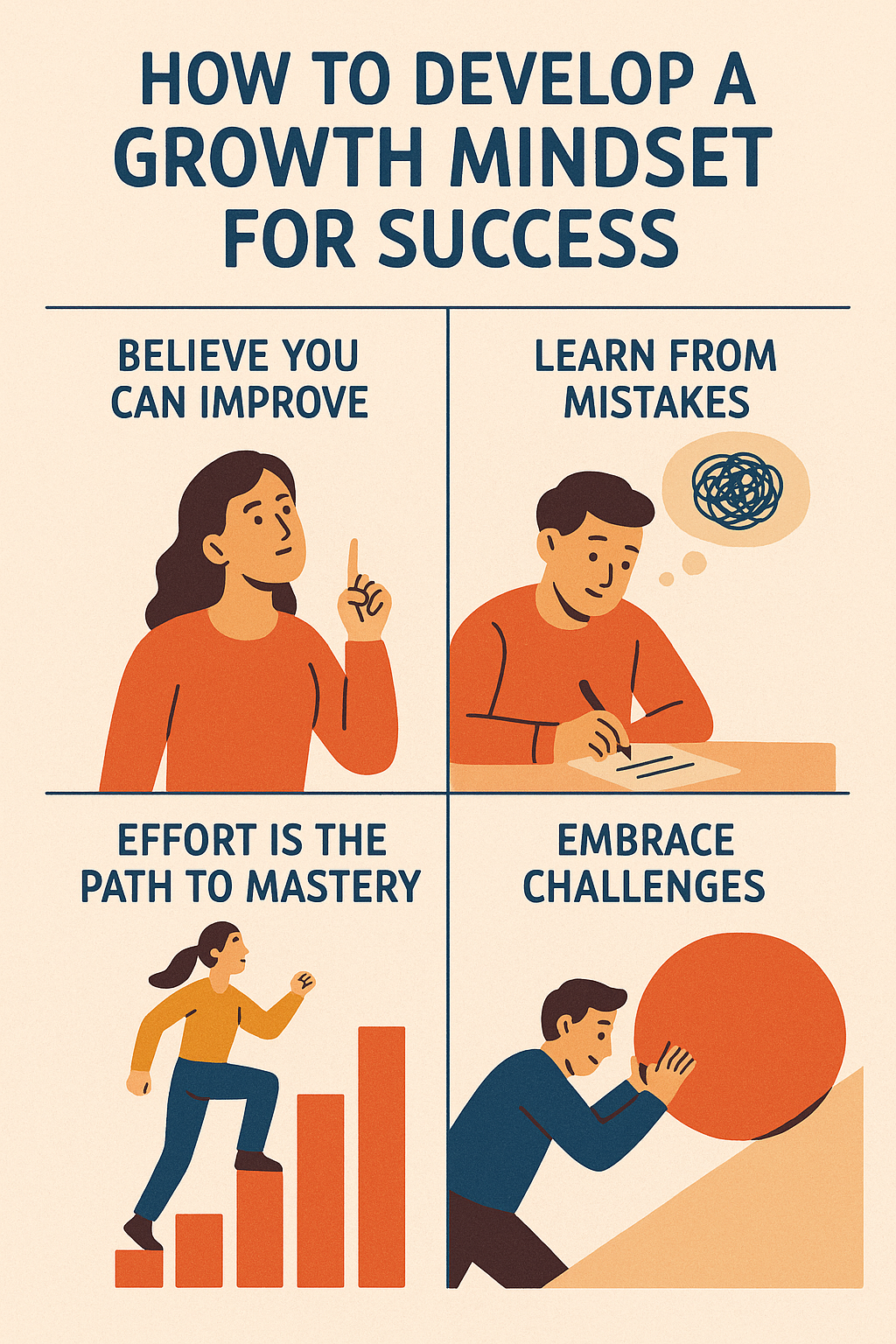A growth mindset is the belief that abilities, intelligence, and skills can be developed through effort, learning, and persistence. People with a growth mindset embrace challenges, learn from failures, and see setbacks as opportunities to grow. On the other hand, a fixed mindset, where people believe that their abilities are static and cannot change, can limit potential and hinder success. Developing a growth mindset is crucial for achieving long-term success in both personal and professional life. In this article, we’ll explore strategies for developing a growth mindset and using it to unlock your full potential.
1. Embrace Challenges
One of the key components of a growth mindset is embracing challenges rather than avoiding them. When you face a challenge head-on, it provides an opportunity to learn, grow, and improve. People with a growth mindset see challenges as stepping stones to greater achievement, rather than obstacles that should be avoided.
Tip: Start by taking on small challenges outside of your comfort zone. Gradually work your way up to bigger challenges, and embrace the opportunity to grow through the process.
2. Learn from Failure
Failure is often viewed as a setback, but with a growth mindset, failure is seen as a learning experience. When you fail, it’s an opportunity to reflect, learn what went wrong, and make adjustments. People with a growth mindset understand that failure is not permanent, it’s simply a part of the learning process that helps them improve.
Tip: After experiencing failure, ask yourself: “What did I learn from this?” Reflect on how you can apply the lessons learned to future attempts. Reframe failure as feedback rather than a roadblock.
3. Cultivate a Love of Learning
A growth mindset is centered around a love of learning and continuous self-improvement. People with a growth mindset are motivated by curiosity and a desire to grow, rather than seeking external validation. They embrace the process of learning and are always looking for new ways to expand their knowledge and skills.
Tip: Commit to lifelong learning by seeking out opportunities for personal and professional development. Whether through reading, taking courses, or learning from mentors, make learning a regular part of your routine.
4. Focus on Effort, Not Just Results
In a growth mindset, effort is valued more than innate talent or intelligence. People with a growth mindset believe that consistent effort leads to improvement and success. They understand that mastery and achievement come with hard work, practice, and persistence.
Tip: Focus on the process of learning and improvement, not just the outcome. Celebrate the effort you put into developing your skills, regardless of immediate results.
5. Develop Resilience
Resilience is a key component of a growth mindset. The ability to bounce back from setbacks, maintain optimism, and keep going despite challenges is essential for long-term success. People with a growth mindset are more likely to persist through difficulties because they believe that their efforts will eventually lead to improvement.
Tip: Practice resilience by adopting a positive attitude toward setbacks. When things don’t go as planned, stay focused on your goals and remind yourself that challenges are opportunities for growth.
6. Change Your Self-Talk
Self-talk plays a powerful role in shaping your mindset. Negative self-talk, such as “I’m not good enough” or “I’ll never be able to do this,” reinforces a fixed mindset and limits potential. On the other hand, positive self-talk that focuses on effort, learning, and growth fosters a growth mindset.
Tip: Practice replacing negative thoughts with positive, growth-oriented statements. For example, instead of saying, “I can’t do this,” say, “I can learn how to do this with practice and persistence.”
7. Celebrate Progress, Not Just Perfection
A growth mindset values progress and improvement over perfection. Instead of aiming for flawless performance, people with a growth mindset celebrate their efforts and incremental progress. This shift in focus helps to build confidence and keeps motivation high, even when results take time.
Tip: Recognize and celebrate small milestones along the way. Focus on the improvement you’ve made, and acknowledge the effort you’ve put into getting closer to your goal.
8. Seek Feedback and Constructive Criticism
Feedback is an essential part of the growth process. People with a growth mindset actively seek feedback, view it as a valuable tool for learning, and use it to improve. Rather than taking feedback personally, they see it as an opportunity to gain insight into areas for improvement.
Tip: Ask for feedback regularly from trusted colleagues, mentors, or peers. Use their constructive criticism to refine your approach and enhance your skills.
9. Surround Yourself with a Growth-Oriented Environment
The people you interact with can influence your mindset. Surrounding yourself with individuals who have a growth mindset can motivate you to adopt the same attitude. People who embrace challenges, share learning experiences, and offer support during difficult times can help you stay committed to your growth journey.
Tip: Seek out a supportive community of individuals who encourage learning, growth, and improvement. Engage in discussions with people who have a positive, growth-oriented attitude.
10. Take Action and Be Patient
Developing a growth mindset requires consistent effort and patience. Change doesn’t happen overnight, and success is the result of continuous learning, practice, and adaptation. Be patient with yourself as you develop a growth mindset, and trust the process. Keep taking action and remain persistent in your pursuit of growth.
Tip: Stay committed to taking small, consistent actions toward your goals. Trust that the cumulative effect of your efforts will lead to long-term success and growth.
